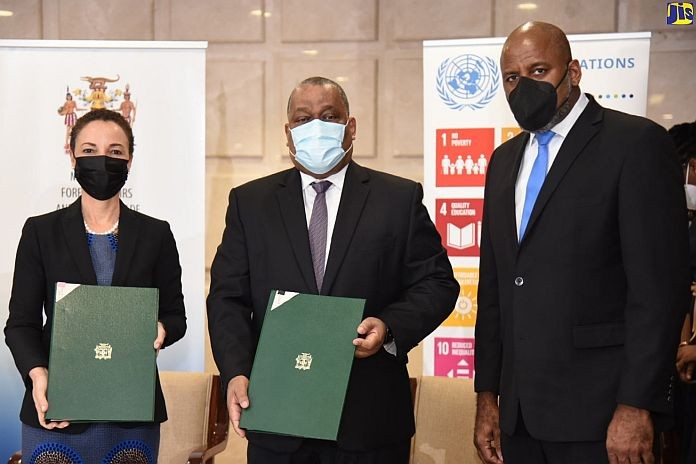By Chanel Spence
KINGSTON, Jamaica, (JIS) – The government of Jamaica has, for the second time, partnered with the United Nations (UN) for further collaboration on multilateral approaches to recover from the pandemic and to implement strategies to attain sustainable development goals.
This was confirmed with the signing of the 2022/26 Multi-Country Sustainable Development Convention Framework (MSDCF), which was crafted with Jamaicans from various sectors.
The signing ceremony was held at the ministry of foreign affairs and foreign trade building in Kingston March 15.
In her remarks, minister of foreign affairs and foreign trade, Senator Kamina Johnson Smith, noted that the magnitude of the pandemic’s impact on the country exposed “gaps” such as “the lack of or inadequate access to essential services and technology, particularly in rural communities”.
Against this backdrop, she noted, these “set the stage” for the importance of economic mechanisms such as the MSDCF, which are intended to support countries in [achieving] economic growth and sustainable development”.
She said the framework will address economic resilience and shared prosperity, equality and well-being, resilience to climate change shocks and sustainable resource management, peace, safety, and the rule of law.
“We maintain and thereby entrust ourselves to a process that suggests, that with a common vision, with shared values, we will, indeed, be able to advance without leaving anyone behind,” she pointed out.

United Nations Resident Coordinator, Dr Garry Conille, said the framework was aligned with Jamaica’s ambitions and priorities.
“As we researched, Jamaica’s academics were there, as we crafted and drafted, Jamaica’s technical teams were there. This framework document is designed and built with partnership,” he stated.
Meanwhile, the Planning Institute of Jamaica (PIOJ) will act as the implementing body under its Country Implementation Plan (CIP).
This plan, according to the director-general of the Institute, Dr Wayne Henry, is comprised of “the collective inputs of the UN agencies in the country. This new MSDCF follows the path of previous frameworks, in terms of local and regional consultations, which benefited from the strong participation of the government”.
He said this “reflects” the UN and government’s interest to implement a programme that is “relevant and meets the needs of the people”.
This agreement will be the 2022/26 chief instrument for the planning and implementation of UN development activities towards the fulfilment of the 2030 agenda.





